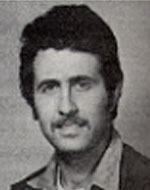Yitzhak, the eldest son of Nurit and Naji, was born on March 8, 1948 in Basra, Iraq, and immigrated to Israel with his parents and siblings in 1951. The Mina family settled in Be’er Sheva and Yitzhak first studied at the Chazon Ovadia school and completed his elementary studies at the Sinai school in the city. Afterward he continued his secondary studies in the real track of the Comprehensive Secondary School in Beer Sheva. In the summer of 1965 he successfully passed the matriculation exams, and at an early age Yitzhak was discovered to be a responsible and serious child, a diligent student who soon became fond of his teachers and classmates. He was very interested in playing basketball, but in the loyalty of a devoted fan he followed the Hapoel Beer Sheva soccer team and did everything he could so as not to miss any of his games. Itzik became a tall, handsome young man whose seven brothers aspired to resemble him. He was purposeful and energetic. He placed great security on those around him. He was genuinely interested in the situation of his friends and took care of the family. His heart was soft once, and even when it was raging, he knew how to calm down and lower his voice. Itzik was a good-looking young man – tall, with blue eyes and frizzy hair. He loved life and knew that honesty, fairness and willingness to give are the foundations of existence. Yitzhak was drafted into the IDF in early February 1966 and after basic training he volunteered for the paratroopers. He was trained as a parachutist and was authorized to wear “paratroopers’ wings”, but he did not limit himself to this achievement and chose to study in a course for commanders and officers of the infantry corps. He was a good officer and a good man, and as a commander, he took care of his people and took care to fulfill his duties in full, and as a person he was absolutely honest and righteous and truthful. In February 1969, Lieutenant Yitzhak completed his compulsory service and enrolled in post-secondary studies at the Technion branch in the Negev capital. During his first year of military service, he decided to volunteer for security activities abroad. One year later, in November 1971, Maggie immigrated to Israel as a new immigrant and the two married in Tel Aviv, where Yitzhak worked as a sales manager at the Volkswagen agency in Tel Aviv and established his home in Givatayim. Maggie: “I adapted easily to the life of the country, because Itzik was by my side, helped me and caught up with my idealistic enthusiasm. Itzik loved Israel as if it were part of him. He also managed to become a devoted patriot.” About a month after his marriage, in May 1972, Itzik was called up for reserve duty and then went on to study in a course for tour officers, and was assigned with some excellent officers from the Paratroopers. When his medical team determined that he would have to leave the unit because of severe eye infections, Itzik refused to accept the law and stubbornly fought to win the PA’s permission to stay there.” When the Yom Kippur War broke out, Itzik was at his parents’ home in Be’er Sheva, and when the call to go arrived, he put on his uniform and set off, and Itzik fought in the commando unit on the northern front. Six members of the Minna family served in the army during those difficult days, and when Itzik discovered his younger brother, Nissim, somewhere in the Golan, the meeting between the brothers was very emotional, and after the fighting ended Yitzhak was transferred to the southern front. On 6 Tevet (31/12/1973) Itzik fell in the line of duty while pursuing a squad of enemy soldiers in Sinai. He was laid to rest in the military cemetery in Be’er Sheva. He left behind a pregnant wife, a father, a mother and seven brothers. After his fall, he was promoted to captain. At the end of July 1974, his daughter, Odelia, was born. “She loves life and loves to laugh just like her father,” said her mother Maggie. According to his brother, Itzik did not have to go into this pursuit, for he had been on a night patrol before, and he went into battle from which he did not return. In a letter of condolence to the bereaved family, the unit commander wrote: “On the fall of Yitzhak, you lost a beloved family member and we, his comrades in the unit, lost a dear and devoted friend who gave his life to Israel and the right to exist.”
